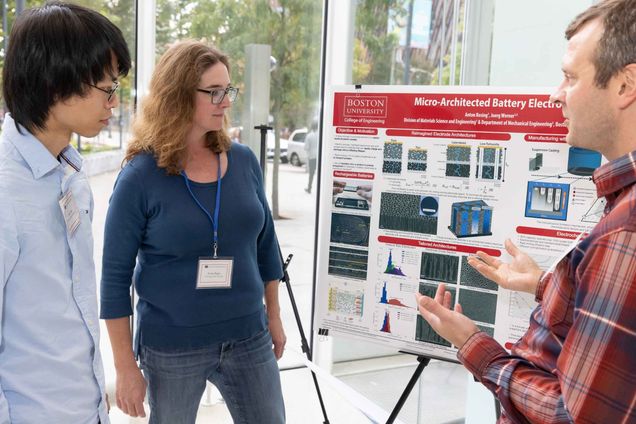Innovating the future of batteries for electric vehicles and grid-level renewable energy storage.
Related Publications
Lithium-ion batteries have driven major advancements in sustainability, energy, and technology — enabling efficient energy storage and powering mobile devices and electric vehicles. But the current technology is rapidly approaching its limits.
Through BU’s Energy and Sustainable Technologies Lab (BEST), researchers at the College of Engineering are working on breakthroughs in next-generation, high energy density batteries to meet the growing demand for energy storage.
Reinventing Battery Architecture
Engineering a better battery interface
To advance next-generation batteries that could be the key to longer-range electric vehicles, grid-level storage for renewables, and more, it is essential to understand and control electrodeposition. Emily Ryan, Associate Professor of Mechanical Engineering in the College of Engineering, is researching the stability of material interfaces in lithium-ion batteries. In collaboration with researchers at The Hebrew University of Jerusalem, Ryan is studying electrodeposition and how it produces stable or unstable interfaces under different material and operating conditions, using computational modeling of battery systems to better understand the physics. This project is funded by the National Science Foundation.
Improving battery operation
Launched in 2023, a two-year BU project is underway to transform battery performance, backed by a Dean’s Catalyst Award in the College of Engineering that is co-sponsored by IGS. Led by Assistant Professors Sean Lubner and Joerg Werner, both in Mechanical Engineering, the project focuses on two pivotal goals:
- Developing batteries that can rapidly charge and discharge without affecting lifespan
- Optimizing both energy and power density, giving smaller batteries more output
To this end, the team is exploring the unknown reasons for low efficiency and battery failure during quick charging with the use of a new technique that allows real-time battery measurement capabilities. Their research into the future of batteries could be significant for advancements in electric vehicles, grid storage, and handheld electronics.
The Race to a Battery-Powered Future

Engineers at BU are figuring out how to make better, more sustainable batteries—a technology that is essential for clean energy
“We know right now we are not on a sustainable path, so I think it is on us to try and come up with solutions to help us get to a more sustainable energy generation and energy use.”
— Emily Ryan, College of Engineering Associate Professor of Mechanical Engineering
Project Leaders
-

Emily Ryan
Associate Director, IGS;
Associate Professor, Mechanical Engineering and Materials Science & Engineering, College of Engineering -

Joerg Werner
Core Faculty, IGS;
Assistant Professor, Mechanical Engineering, College of Engineering -

Sean Lubner
Core Faculty, IGS;
Assistant Professor, Mechanical Engineering, College of Engineering


